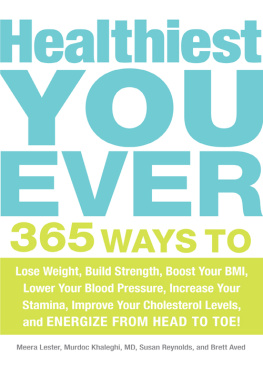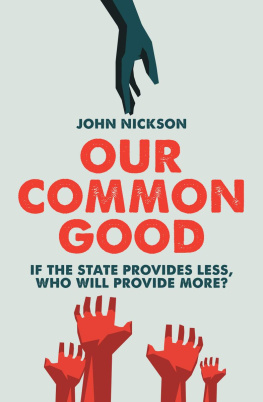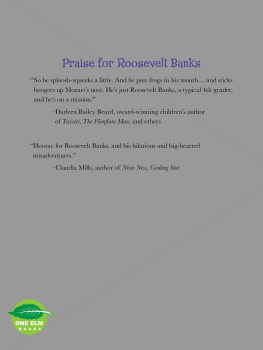Healthiest
YOU
EVER
WAYS TO
Lose Weight, Build Strength, Boost Your BMI, Lower Your Blood Pressure, Increase Your Stamina, Improve Your Cholesterol Levels, and Energize from Head to Toe!
Meera Lester, Murdoc Khaleghi, MD, Susan Reynolds, and Brett Aved

INTRODUCTION
If youre healthy, you have more wealth than money could ever buy. But are you as healthy as you could be? Even if youre doing a hundred things rightwatching your weight, working out a few days a week, eating plenty of fruits and vegetables, limiting food with too much sugar or saturated fat, feeding and challenging your brain, nurturing your spirit as well as your fleshtheres also a lot more you can do. Fortunately, Healthiest You Ever is designed to offer you a full year of actionable information in seven categories, one for each day of the week, so you can do something every day to improve your health and fitness. The categories are as follows:
Monday: Diet and Nutrition
Tuesday: Strength
Wednesday: Mental Agility
Thursday: Endurance
Friday: Flexibility
Saturday: Recreation
Sunday: Rest
As you work your way through the book youll notice that the fitness items progress from the easiest or beginning levels of each activity to the harder, more difficult items. This way, you can start slowly and build toward improved flexibility, increased strength, and bolstered endurance. Some of the suggestions overlap, but each offers a new aspect, a new level, or a new attitude that can lead to progress or a deepening of your practice. The entries on rest include everything from actual sleep to meditation to spiritual renewal. And throughout the book youll also find a wealth of recreational activities that will bolster your fitnessand your fun!
Together, the 365 entries found within will provide you with a game plan for vastly improving your overall health and fitness. The mere fact that youve picked up this book means that youre someone who takes personal responsibility and who strives to become an ever-better version of yourself. All you need to do is put the plan in motion by picking up the proverbial sword and marching boldly forwardone day at a time. So, hurry up, turn the page, and get started!
WEEK ONE
DIET AND NUTRITION | MONDAY
Eighty percent of weight loss comes as a result of wise food choices.
Fitz Koehler, fitness expert
Keep a Food Diary for at Least a Week
Do you even know how much and when you eat during a typical day? Most people dont. The best way to learn is to keep a food journal for at least a week. Using a notebook, your iPad, your smart phone, your running log, or a calendar (something you can keep a record in), write down everything you eat and when you eat it. Dont cheat! List even the breath mints you chew on during meetings. Its also helpful to note where your eating has taken placeat your desk? in the cafeteria? in front of the TV?and how you were feeling at the timesuper stressed? depressed? tipsy? This will help you identify your eating triggers and whatever bad habits you may have formed regarding eating.
After a full week youll have a good idea of the what, when, where, and why of your eating patterns. From the brief discussion here, you should be able to see from your food diary where youre making your nutritional no-noes. How often have you skipped breakfast? How often have you eaten high-fat foods like junk food, desserts, and fried food? What are your snacking habits? How many fruits and vegetables do you eat in a typical week? How often do you eat because youre feeling blue or stressed, rather than hungry? Which foods do you gravitate toward to elevate your moods?
STRENGTH | TUESDAY
When you first start weight training, dont be surprised if you actually gain weight. This is a normal reaction for many people. The average person starting an exercise program may gain 3 to 5 pounds. If youre among these people, youve successfully gained lean body mass or muscles. Congratulate yourself. You deserve a pat on the back for all your hard work!
Shirley S. Archer, fitness professional, Stanford University School of Medicine
Check Your Body Composition
Your body composition refers to the percentage of fat and percentage of fat-free body mass that makes up your total body weight. Fat-free mass, also known as lean-body mass, consists primarily of muscle tissue, bones, and blood, essentially all the rest of your body that is not fat.
Research suggests that the ideal percentage of body fat for men is 15 to 18 percent. For women, the ideal range of body fat is 22 to 25 percent. Its important to remember that these are suggested ranges. Some individuals with a higher percentage of body fat who are regularly active may still be considered at a healthy weight.
When you begin your improvement program, you might want to measure your body composition. This way, youll have a baseline against which to measure the effectiveness of your program over time. You can see how much muscle mass you have when you get started. Every six weeks or so, you can check to see how much more muscle mass you have developed. If youre a person who is motivated by numbers, this is a concrete way to stay excited about your progress.
MENTAL AGILITY | WEDNESDAY
Exercise doesnt make you smarter, but what it does do is optimize the brain for learning.
Dr. John J. Ratey, MD, Harvard Medical School
Exercise for Thirty Minutes a Day
Regular exercise is essential if youre looking to preserve your mental acuity. Aerobic exercise helps get the blood coursing through your system, carrying oxygen and glucose to your braintwo substances the brain needs in order to function. Regular exercise can also prod the brain into producing more molecules that help protect and produce the brains neurons. Though studies are still underway to establish the link between exercise and increased brain neurons, many researchersincluding those involved with Alzheimers disease researchare studying the protective effects of regular physical exercise on the brains neural paths for transmitting signals.
The U.S. federal guidelines for exercise say that getting at least thirty minutes a day most days a week will help prevent heart disease, osteoporosis, diabetes, obesity, and now, perhaps, Alzheimers. If you do nothing else, a brisk thirty-minute walk every day will do wonders for your brain health.
IT ALSO KEEPS YOUR BRAIN YOUNG
As you get older, exercise becomes even better for your overall brain health. Neuroscientists have shown that in aging populations (usually those over age sixty-five), sustained, moderate exercise participation enhances learning and memory, improves the function of the neocortex, counteracts age-related and disease-related mental decline, and protects against age-related atrophy in brain areas crucial for thinking and learning. Exercise has been cited by several researchers, including those at UC Irvine, as being the number one factor in sustaining brain health and the ability to make new neurons in an aging brain.
ENDURANCE | THURSDAY
My attitude is that if you push me towards something that you think is a weakness, then I will turn that perceived weakness into a strength.









